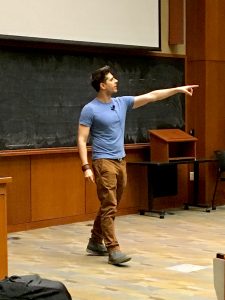 Last Wednesday, Carlos Andrés Gómez spoke about his experiences with the societal expectations of manliness.
Last Wednesday, Carlos Andrés Gómez spoke about his experiences with the societal expectations of manliness.
The author of Man Up: Reimagining Modern Manhood, whose poetry and spoken word work has received countless accolades from the 2015 Lucille Clifton Poetry Prize and 2015 Makeda Bilqis Literary Award to two nominations for the Pushcart Prize, began by telling the story of the first time he heard the phrase “man up.”
He was six-years-old, playing in a soccer game. As he was running toward the ball, he face-planted and started crying. Gómez remembered watching his coach walk over toward him, and he remembered hoping that his coach would hug and carry him. Gómez recounted what happened instead.
“He walks over and he’s like, ‘Stop crying. What are you, a little baby? What are you a little boy?’ And I’m like, ‘yeah, I am a little boy.’ He says, ‘Get back out there man! Man up!’”
It was a turning point for Gómez.
“I had the first major identity crisis of my life. I was like if I can’t cry when I do a tooth-plant in front of 300 people playing peewee soccer and bleeding from my mouth and my nose, when am I allowed to express emotion?”
Gómez realized he had a dilemma: his personality was the complete opposite of the cultural idea of manliness. He responded to this issue by changing from a sweet, affectionate, emotionally literate kid into a hollow, athletic, disconnected teenager. For Christmas, he only asked for a bench press.
“I stopped saying I love you,” he said. “I stopped giving hugs. I stopped being affectionate. I just pictured myself as this prison, in a way, like a fortress that nothing could scale, and nothing could penetrate, and nothing could defeat, and nothing could break.”
Gómez remembered observing certain young men in his high school to learn how they walked, spoke, and treated women.

He explained, “Gender is a performance… It’s one of those things where everyone’s kinda watching each other.”
Gómez was a popular kid and a star basketball player, and the adolescent was even voted “ladies’ man” by his peers. But his reputation completely shifted when Gómez turned seventeen.
Martín Espada, a Puerto Rican poet, came to his high school to read poetry. Despite sitting with his basketball friends and having made fun of poetry all day, Gómez began crying.
“And then I feel this thing kind of move up in my stomach and up through my torso. And, at first, I was so disembodied that I genuinely thought it was indigestion,” he explained. “I thought there was actually something physically wrong with me.”
“It was one of those moments where I was like cool, I just spent eleven and a half years constructing this perfect, not just perfect, the only idea of what a man is allowed to be. If anyone sees me crying in the back of this auditorium in my high school, I’m going to lose all that work. So I start walking out of the auditorium. But then I felt Martín Espada in my guts.”
So he stayed, weeping, in the back of the auditorium.
To Gómez, “man up” is a detrimental and unfairly defining phrase. It may seem common and unassuming, but Gómez explains that for many young men it slowly chips away at their emotional literacy and sense of security. To him, the phrase promotes a necessity for men to prove that they match certain ideals of society, and it harshly implies that men who show emotion are not “manly” and thus not worthy in the same way that other men are. This idea is thrust upon men from extremely young ages, and it has ramifications on all aspects of social interaction.
“Over 96% of all the violent perpetrators are male,” he said, extending the impact of the phrase to tangible statistics. “It’s not a coincidence.”
It took seventeen years, but Gómez had realized something on that one day in high school.
“Everything I’ve been taught about being a man is leading to my own demise. Literally,” he noted. “It hurts people. It kills people. I know people it has killed. There are too many people I know who have died because of violence connected to masculinity. It harms women, and trans, and non-binary most directly, but it also hurts men. It hurts everybody.”
Gómez decided to change from a star athlete to an artist.
“I made a decision. I said I’m going to spend the rest of my life as an artist, as a man, and as a human being, trying to challenge and dismantle this one-dimensional toxic idea that a guy has got to be this,” the poet said. “And I’m gonna [sic] be myself, by any means necessary… I said I am going to be deliberate about developing a literacy about what I’m feeling.”
Today, Gómez has used public speaking and poetry to reach this goal, calling poetry “building a language for the unsayable.”
Since adolescent realization, Gómez has become a leading expert on gender-based actions and on the emotional impact of society’s demands on men and women to conform to predetermined roles. Now, Gómez spends his time traveling to various countries and states to speak about his experiences, and, in his free time, he spends his days with his wife and baby daughter.
Throughout his performance, students alternated between laughing at his many jokes and snapping passionately in agreement with his poetry. After Gómez finished, the room erupted in applause.
As the auditorium slowly emptied, I overheard one male student say to another, “Man, I’m so glad we came.”
—
To watch Gómez’s spoken word pieces or to learn more about him, please visit his website here.
















